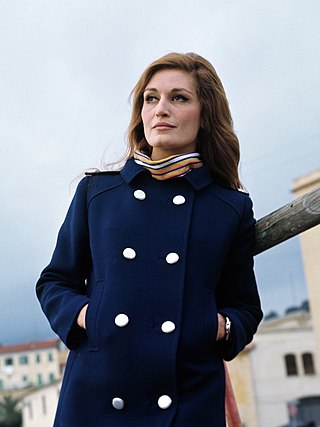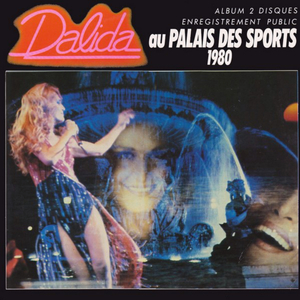
Jean-Philippe Léo Smet, better known by his stage name Johnny Hallyday, was a French rock and roll and pop singer and actor, credited with having brought rock and roll to France.

Iolanda Cristina Gigliotti, professionally known as Dalida, was an Italian naturalized French singer and actress. Leading an international career, Dalida has sold over 140 million records worldwide. Her best known songs include "Bambino", "Gondolier", "Les Enfants du Pirée", "Le Temps des fleurs", "Darla dirladada", "J'attendrai", "La Danse de Zorba", "Bang Bang", "Il venait d'avoir 18 ans", "Le Jour où la pluie viendra", "Gigi l'amoroso", "Laissez-moi danser", "Salama ya salama", "Helwa ya baladi", "Mourir sur scène" and "Paroles, paroles" featuring spoken word by Alain Delon.

1 fille & 4 types is the twentieth studio album and twelfth French-language album by Canadian singer Celine Dion, released by Sony Music on 13 October 2003. 1 fille & 4 types features thirteen songs written and arranged by Jean-Jacques Goldman, Erick Benzi, Jacques Veneruso, and Gildas Arzel, and produced by Benzi. The first single from the album, "Tout l'or des hommes", reached top ten in all Francophone countries, including number one in Quebec and number three in France. It was followed by "Et je t'aime encore" and "Contre nature".

Gilles Marchal, born Gilles Pastre, was a French songwriter and singer who reached the height of his career during the 1970s.

Gaston Ghrenassia , known by his stage name Enrico Macias, is a French singer, songwriter and musician of Algerian Jewish descent.

Rick Allison is a Belgian-born Canadian singer, author and record producer.

Une Vie is an album by Dalida, which continues the adult contemporary style of her previous album and contains songs such as the Italian "Mamy blue", "Avec le temps" and "Les Choses de l'amour".

Julien is a studio album of songs by Dalida recorded and released in 1973.

Palais des Sports 80 is a live double album by Dalida, recorded live at the Palais des Sports in Paris in January 1980.

Mondialement vôtre is a multi-language album released by Dalida in 1982. This album contains new French single material, plus other language versions of Dalida previous hits and a new Arabic Medley called "Aghani Aghani" that is the biggest hit of the album.

Dali is a French-language album released in 1984 by French - Italian singer Dalida.

Marie Laforêt was a French singer and actress, particularly well known for her work during the 1960s and 1970s. In 1978, she moved to Geneva, and acquired Swiss citizenship.

On ne change pas is the seventh home video by Canadian singer Celine Dion, released on 18 November 2005 by Columbia Records. It includes Dion's music videos of her French greatest hits, released for the first time on DVD. The videos were filmed between 1986 and 2005. The DVD also features over one hour of bonus material. It was preceded by the release of Dion's first comprehensive French-language greatest hits album, also titled On ne change pas.

40 chansons d'or is a double-CD by Charles Aznavour, released in 1994 on EMI Records. It was reissued in 1996 with a different track listing.
Hélène Rollès is a French actress and singer, primarily known for her major role in the TV sitcom Hélène et les Garçons, alongside Sébastien Roch.

Yvon Éthier better known as Patrick Norman is a Canadian country musician. He sings both in French and English and has had hits in Quebec and in the rest of Canada.

L'Indigné is a 20-CD box set compilation of the recorded studio albums of Léo Ferré for Barclay Records between 1960 and 1974. The limited edition box set was released to mark the 20th anniversary of Ferré's death. The box set brings for the first time together 18 albums remastered from the original records. Live albums and lyrics are not included.
















